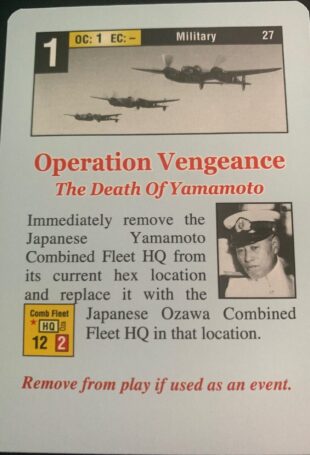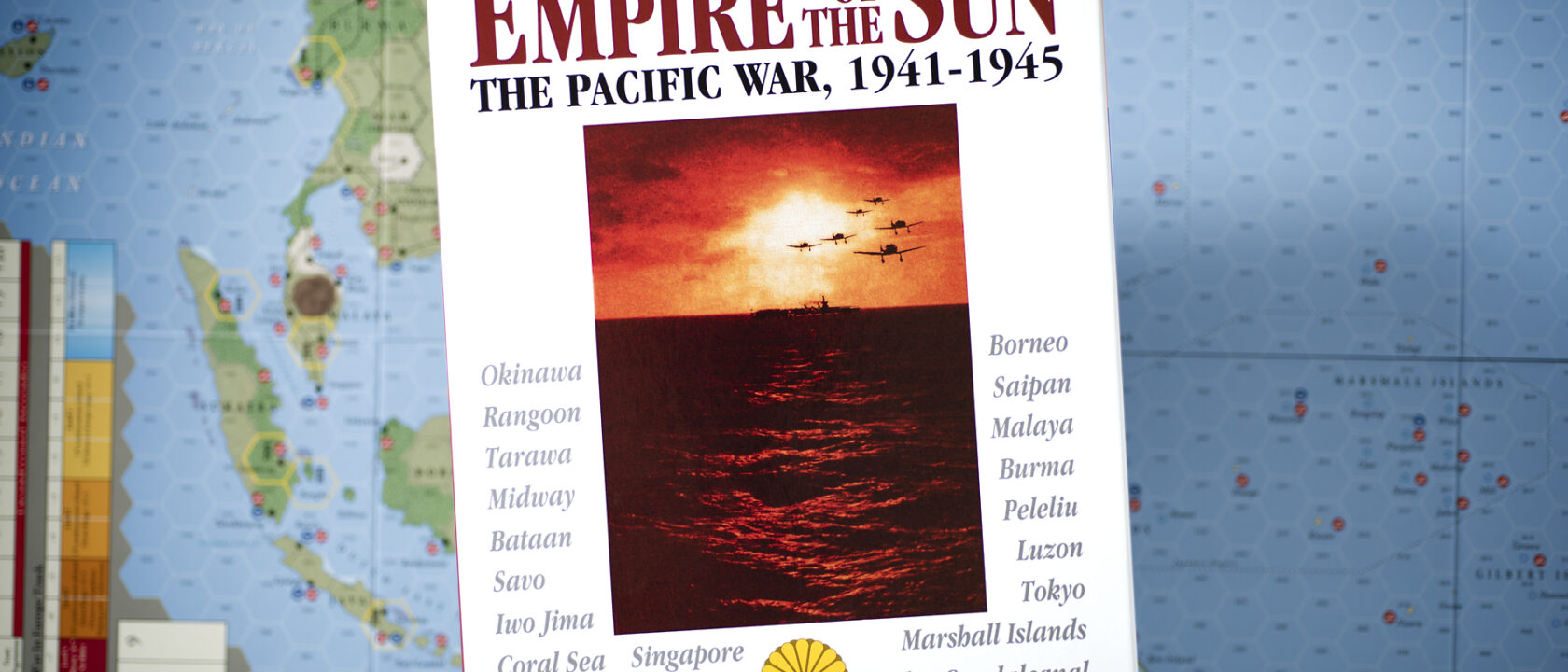This post is from Geoff Engelstein, a game designer and educator. Some of his designs include The Expanse, the Super Skill Pinball series, Versailles 1919 (with Mark Herman) and the upcoming Zheng He (with David Thompson). A full bio is at the end of this post.
Geoff will also be doing a digital seminar on his views on the future of historical gaming on August 24, with that seminar exclusively for attendees of SD HistCon’s upcoming Summit 2023 November 3-5 convention in San Diego. Registration information for that convention, which includes this and other pre-convention seminars, is at the bottom of this post.

Geoff Engelstein.
My favorite card is “Operation Vengeance: The Death of Yamamoto” from Mark Herman’s Empire of the Sun (GMT Games, 2005).
I love this card not because of the effect, or because I have it in for Admiral Isoroku Yamamoto.
I love it because it always makes me think about how history is represented in simulation games.
In 1943 the US intercepted Japanese communications revealing the itinerary of Yamamoto, the commander-in-chief of Japan’s Combined Fleet, who was visiting several bases in the South Pacific. Operation Vengeance was quickly planned specifically to take down Yamamoto’s plane. He was successfully shot down four days after the intel was received, on April 18th, and was killed.
The interesting part is what isn’t in the game. U.S. general Douglas MacArthur, for example, cannot be killed in Empire of the Sun, even though it was a distinct possibility that he could have been captured in the Philippines. Only Yamamoto can be killed. The scope of the game is limited to the events that Herman decided to represent with the Event cards.
On one hand, this makes perfect sense given the point of the card events. They are designed to educate, and give players a touchstone to connect the real history with what happens on the table in front of them. Also, if counterfactual events were to be included, the designer would have to fabricate them, some out of thin air. Charles Vasey’s game Unhappy King Charles (2008, GMT Games, set for a new edition from PHALANX) is one CDG that includes counterfactual cards, and the cards are labeled ‘Alt-Hist’ so that players are aware of what ‘really’ happened.
On the other hand, though, including only historical events necessarily constrains the scope of the game and the ‘what if’ level that it can portray.
 Please don’t get me wrong—I thoroughly enjoy many, many CDG games. But this aspect of them always gives me the feeling of operating within a constrained sandbox.
Please don’t get me wrong—I thoroughly enjoy many, many CDG games. But this aspect of them always gives me the feeling of operating within a constrained sandbox.
One of the pleasures of simulation gaming is exploring counterfactuals—what could have happened, as opposed to what did happen. The designer must make decisions about what will be possible within the scope of the game. There are many bizarre events in history, particularly in warfare, and it is difficult to imagine things other than ‘near-miss’ events that almost occurred.
One option is to simply abstract away many things, lumping them into extreme results on a combat results table, for example. However, as you want to incorporate more detailed history into the game, as CDGs do, you have to make more pointed editorial decisions about what goes in, and the more you leave out. Every design is filled with trade-offs.
The more specific history is included in a game, the less room there is for alternate history. And for me, the Operation Vengeance card from Empire of the Sun best exemplifies this paradox.
Beyond Geoff’s game designs, including The Expanse, the Super Skill Pinball series, Versailles 1919 (with Mark Herman) and the upcoming Zheng He (with David Thompson), he is also the author of several books. Those include Building Blocks of Tabletop Game Design, Achievement Relocked, and the upcoming The Universe Explained with a Cookie.
Geoff founded and previously hosted the Ludology podcast, and currently publishes the GameTek newsletter on game design via Substack. When not designing, thinking about, or playing games, he runs Mars International, an electronics and software development and manufacturing business in New Jersey. You can follow him on Twitter here. For those interested in Geoff’s August 24 digital seminar, you can register for the fall SD HistCon (Nov. 3-5) here.
